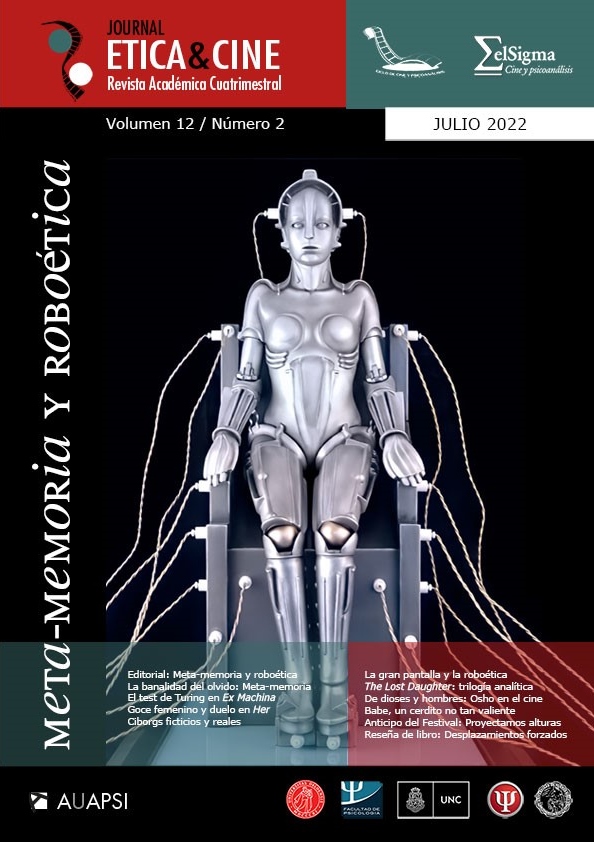Babe, a pig not so gallant
DOI:
https://doi.org/10.31056/2250.5415.v12.n2.38333Keywords:
Movies, Bioethics, Animal ethics, Farm animals, Social construction, SpeciesismAbstract
Babe, a Little pig goes a long way is a film that has generally been used as a fable with the moral of each individual is the owner of his own destiny, but the lesson does not end there, from a critical perspective, the moral is if you don’t want to be food, you should help taking care of the food-animals. From anthropomorphizing animals as narrative subjects that inside their animality have a life story to tell, this movie exposes the way as humans have classified animals according to arbitrary parameters as use and the inconformity of some animals because of the place humans have given them in the world. Beginning with duck Ferdinand and young pig babe search of not being the dinner, I pretend to expose the necessity of being an indispensable animal in a human world, the individualism that brings his search and the high cost that comes with being emancipated from food category.
Downloads
References
American Humane Association. Babe (1995). No Animals Were Harmed a program of American Humane. Recuperado el 15 de junio de 2020 de https://humanehollywood.org/production/babe/
Aristóteles. (1988). Política. M, García Valdés. (Trad.). Editorial Gredos.
Arluke, A. & Sanders, C. (1996). Regarding animals. Temple University Press Philadelphia.
DeMello, M. (2012). The Social Construction of Animals. En: Animals and Society: An Introduction to Human-Animal Studies. Columbia University Press.
Douglas, M. (1973). Pureza y Peligro. Editorial Siglo XXI.
Guthrie, S. (2013. Encyclopedia of Science and Religions. Springer Reference.
Heldke, L. (2011). A Pragmatism Philosophical Consideration of the Pig in Literature, Song and Film, With Special Emphasis on the Ones That Got Away. En: Issues in Ethics and Animal Rights. Astral.
Horta, O. (2010). What is speciesism? The Journal of Agricultural and Environmental Ethics, 23, pp. 243-266.
Michel Fariña, J., & Solbakk, J. (2012). (Bio)ética: el cine como moderno teatro griego. En: (Bio)ética y cine, tragedia griega y acontecimiento del cuerpo. Letra Viva.
Nobis, N. (2009). The Babe Vegetarians: bioethics, animal minds and moral methodology. En: Bioethics at the movies. The John Hopkins University Press.
Noonan, C. (Director). (1995). Babe [Película]. Kennedy Miller Productions.
Orwell, G. (2019). Rebelión en la granja. Debolsillo
Plumwood, V. (2012). ‘Babe’: The tale of the speaking meat. En: The Eye of the Crocodile. Australian National University Press.
Simon, J. (2002). Anthropomorphism: The Non-Human as Human. En: Animal Rights and the Politics of Literary Representation. Palgrave Macmillan.
Singer, P. (2011). Liberación Animal. Trotta.
Stibe, A. (2001). Language, Power and The Social Construction. Society and Animals, 9(2), pp. 145-161.
The New York Times. (enero 7 de 2011). Dick King-Smith, Author Whose Novel Inspired ‘Babe’, Dies at 88. The New York Times. https://www.nytimes.com/2011/01/08/books/08smith.html
Downloads
Published
How to Cite
Issue
Section
License
Copyright (c) 2022 Ética y Cine Journal

This work is licensed under a Creative Commons Attribution-ShareAlike 4.0 International License.
Los autores que publiquen en Ética y Cine Journal aceptan las siguientes condiciones:
Los autores/as conservan los derechos de autor © y permiten la publicación a Ética y Cine Journal, bajo licencia CC BY-SA / Reconocimiento - Reconocimiento-CompartirIgual 4.0 Internacional. La adopción de esta licencia permite copiar, redistribuir, comunicar públicamente la obra, reconociendo los créditos de la misma, y construir sobre el material publicado, debiendo otorgar el crédito apropiado a través de un enlace a la licencia e indicando si se realizaron cambios.

Este obra está bajo una licencia de Creative Commons Reconocimiento-CompartirIgual 4.0 Internacional.




